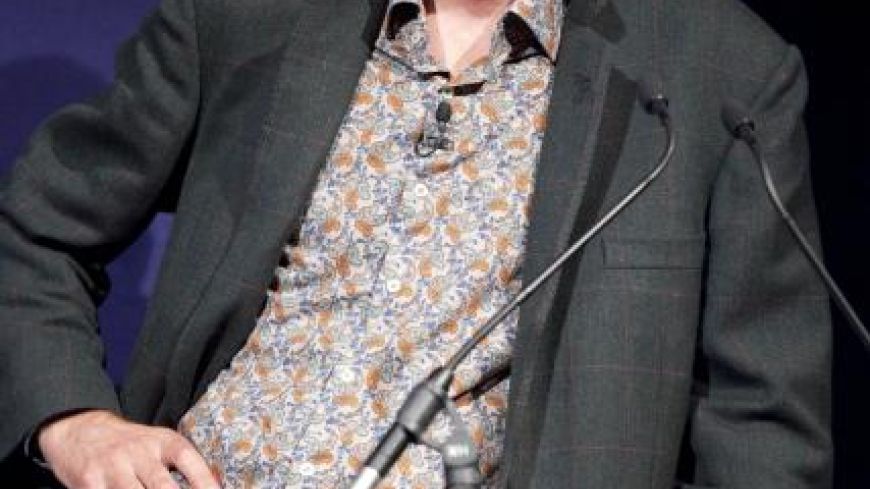
Will Self’s hour-long chat at the Edinburgh International Book Festival was characteristically lucid, witty, and peppered with deprecating humour.
Self, even taller and more gangly then he looks on television, was at the EIBF, to read/promote Shark, his follow-up - or “sprequel” as he jokingly described it - to his Man Booker shortlisted novel Umbrella. As someone who hasn’t read either (yet!) it was something of a relief that the conversation about the new work, with Scotland On Sunday literary editor Stewart Kelly, flowed easily across a range of subjects from Self’s parental and literary influences, to “the creepiest thing” you can say to your lover.
Shark sees the return of the maverick psychiatrist Zack Busner of Umbrella, who takes an acid trip with residents of the Seventies therapeutic community ‘Concept House’ to test the validity of one of the resident’s stories about a massive shark attack.
Kelly opened asking rather drily about the “high modernist” style of the books, the inter-cutting of popular songs of the time with the characters’ consciousness, and allusions to modernist texts like The Waste Land and Finnegan’s Wake. Self, in a quick change of gear, gibed that he had “mostly put that Eliot stuff in for you, Stewart”; and as to the contribution of James Joyce, “I’d have been very happy if he’d taken up some of the labour,” he said.
Kelly pressed on why Self used stream of consciousness as the narrative voice in Shark, particularly one where each character’s stream of consciousness seem so permeable. A good discussion ensued on the advantages and limitations of such a narrative style.
“I’m shedding readers by the cartload so it can hardly be a commercial decision,” guffawed Self. He added that it was an “emotional” goal, a “user-friendly technique”, even though frustratingly no individual can really tap another’s consciousness, rather only allude to it. It also makes for tricky public readings (“I’ll do my best, as my mum used to say,” Self prefaced an intense, psychedelic passage from the book.)
Self described the human consciousness being like living in bubble worlds that touch but never meet. To illustrate his point he recalled how he once used the line with an old girlfriend:
“I’m jealous of your thoughts because they’re inside you.”
“That’s the creepiest thing that you could say,” was the response.
Following which he added, “And we’re still married.”
Shark links the sinking of the ship that carried the fissile material that would be dropped on Hiroshima, with the loss of 900 crew, 200 of them to a massive shark attack. The trauma of war is traced to subsequent mental pathology.
“People often ask me why do you write about mentally ill people all the time?” said Self. “The great challenge is our capacity for compassion,” he answered. “There’s a duty of compassion.”
He added that while we can be close in our bubble worlds, we can’t with the mentally ill.
The discussion turned on psychiatric pioneer and author of the Divided Self R.D. Laing (“a cultural icon of the psyche”, a rockstar, but ultimately “a travesty of himself”). Self suggested that when looking at the efficacy of treatments for mental health, it comes down to people and their compassion not systems of practice.
Further questions brought up Self’s ideas about society’s changing attitudes toward war and violence. He was drawn to Hiroshima because it was such “an epochral event...a break-point in our so-called civilisation”.
Now, he noted a creeping tendency toward “valourising” war, in spite of recent attempts at sensitive memorials to the war dead of World War I.
“We’re not living lives of quiet desperation, rather well-cushioned ennui... ‘Oh, I’ll just have a sit-down’.... ‘For a decade.’”
Interestingly, one of the characters in Shark, Peter, is based on his father who was a Conscientious Objector. His jewish mother saw his father’s stance as “shameful” and it was the source of domestic strife.
On the subject of authorship, it was interesting to hear Self’s method for crafting his oeuvres. “I plan carefully. I draw diagrams. Then I ignore them. The text takes on a life of it’s own.”
He also illustrated his pessimism that, in the digital era, “the serious novel can’t possibly survive except for among a few cognescenti” with a hilarious image of someone going online to read a book and ending up with a pair or reindeer oven gloves.
An entertaining and revelatory hour.

